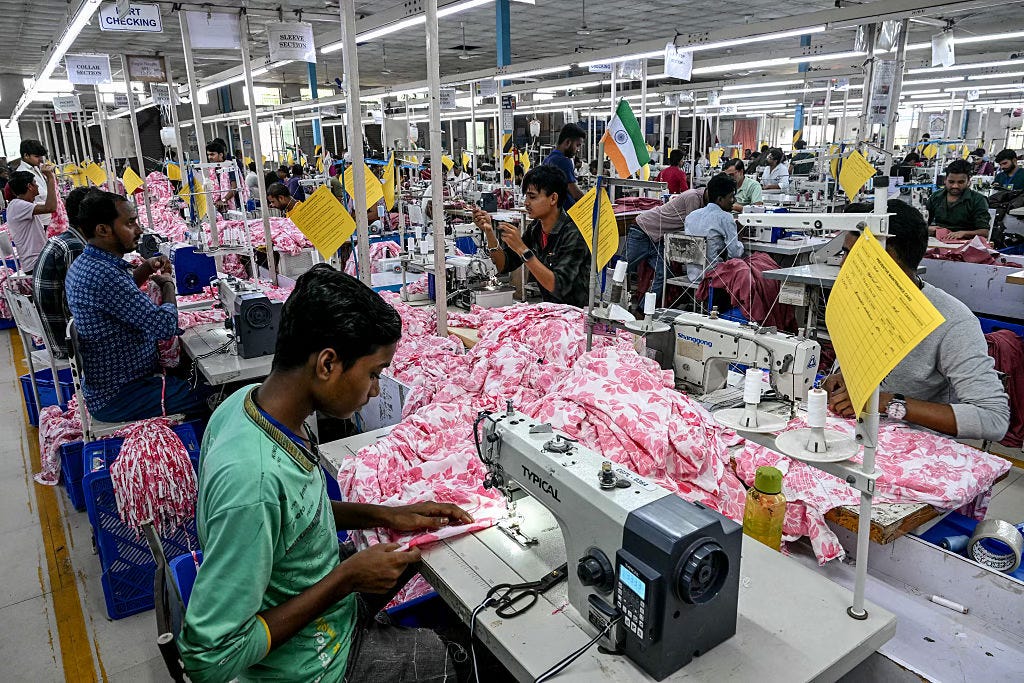It’s Thursday, July 31. This is The Front Page, your daily window into the world of The Free Press—and our take on the world at large. Today: Tyler Cowen says Trump’s EU trade deal is an embarrassment; a Jewish student says Princeton’s safety chief shoved him down a stairwell; why Sydney Sweeney’s genes jeans broke the internet this week; and more.
But first: The ugly campaign against Vinay Prasad.
Three months ago, when Dr. Marty Makary, the commissioner of the Food and Drug Administration, named Dr. Vinay Prasad to serve as the head of the FDA’s Center for Biologics Evaluation and Research, this is how he described the oncologist, Substacker, and frequent critic of the public-health establishment: “Dr. Prasad brings the kind of scientific rigor, independence, and transparency we need at CBER.”
We here at The Free Press have long admired Prasad for precisely the reasons Makary cited. And his early policy decisions as the FDA’s top vaccine and gene therapy regulator, such as ending the foolish recommendation that young children be vaccinated against Covid-19, made it seem possible that the public might regain its lost faith in the government’s public-health bureaucracy after the pandemic fiasco.
So we were dismayed to see him abruptly leave the FDA on Wednesday. He technically resigned, but the truth is much uglier than that. Check out our editorial on how Prasad was ousted—and why it’s such an ominous sign.
A central character in the campaign against Prasad was Laura Loomer. The online influencer, who has Trump’s ear, went after Prasad in recent days, accusing him of being a “progressive leftist provocateur,” among other things. Loomer, a far-right pundit and failed congressional candidate, has cultivated a close relationship with the president. And she’s used that influence to help eliminate a number of high-ranking White House officials. So how does she do it? Gabe Kaminsky has the answer.
—The Editors
President Donald Trump is touting his new trade bill with the European Union, which will put a 15 percent tariff on most European imports. But while Trump claims another trade-war victory, Tyler Cowen argues that the deal is a complete embarrassment—not just for Europe, but also for the president himself.
Sydney Sweeney’s American Eagle ad—complete with a pun about great “jeans” and great “genes”—sparked accusations of Nazi dog whistles, body fascism, and cultural regression. But as Kara Kennedy writes, maybe the real trigger was that Sweeney is hot, she knows it, she’s unbothered by the male gaze, and she’s making millions from it. After an era that tried to convince us everyone is beautiful, she’s proof of an age-old truth: A busty blonde can still move markets and shake the ground.
Frannie Block and Maya Sulkin
When David Piegaro, a Jewish Army veteran and Princeton student, filmed a pro-Palestine protest on campus, he was allegedly pushed down the stairs, arrested on charges including trespassing and resisting arrest, and later hospitalized. Though later found not guilty of all charges, he says the university punished him anyway—evicting him from housing and placing him on probation. He calls it an “incredible betrayal.” Frannie Block and Maya Sulkin report on the lawsuit.

-
President Trump announced a 25 percent tariff on imports from India, citing high Indian trade barriers and its ties to Russia. The move is part of a broader push toward historically high tariff levels, with U.S. consumers already facing the steepest rates since 1934. India, a major trade partner and rising tech exporter, will be significantly affected—especially as Apple increasingly relies on Indian manufacturing.
-
Trump has raised U.S. tariffs to their highest level since before World War II, with an effective rate now at 17.3 percent, according to Yale’s Budget Lab. Nearly 45 percent of U.S. imports face high tariffs, as Trump’s protectionist agenda reshapes global trade. While some countries struck deals for partial relief, most still face steeper tariffs than before—and more hikes may come if no deals are reached by August 1.
-
Zohran Mamdani, the Democratic nominee for New York City mayor, is returning from Uganda on Wednesday amid threats from Trump allies calling for his deportation. His campaign is preparing for potential confrontation at JFK airport, though immigration officials confirmed citizens cannot be denied entry. Recent polls, meanwhile, show Mamdani is the runaway front-runner in the race for mayor.
-
Defense Secretary Pete Hegseth has privately discussed running for governor of Tennessee, according to NBC News, though he would need to resign from his post and may not meet eligibility requirements. While some sources say the conversations were serious, others close to Hegseth deny he’s considering a run.
-
A Chinese company, Nongfu Spring, quietly purchased a $67 million property near Nashua, New Hampshire’s water supply, sparking local and national security concerns. The city, recently named the hottest U.S. housing market, is now at the center of controversy over foreign influence and proximity to military sites. State lawmakers, citing espionage risks, have called for stricter scrutiny and passed legislation barring land purchases by hostile foreign entities—though too late to block this deal.
-
A planned AI data center near Cheyenne, Wyoming, would use more electricity than all the state’s homes combined—eventually demanding double the state’s total power output. Backed by energy infrastructure company Tallgrass and AI data center developer Crusoe, the project will rely on its own gas and renewables, highlighting the growing energy footprint of AI. Though the tenant is unknown, speculation points to OpenAI, which is rapidly expanding its data infrastructure nationwide.
-
Facing ongoing manpower shortages, Ukrainian president Volodymyr Zelensky signed a law allowing citizens over 60 to voluntarily enlist in the military during martial law. Recruits must pass medical exams and a probationary period, with all contracts voided once martial law ends. The move follows earlier efforts to expand military ranks, as Russia also shifts toward year-round conscription amid rising war losses.
-
Ghislaine Maxwell may be in danger after reportedly meeting with the DOJ to share new information about Jeffrey Epstein, says Miami Herald investigative journalist Julie K. Brown. Concerns about her safety in prison have resurfaced, echoing fears following Epstein’s 2019 death in federal custody. Brown warned, “She wouldn’t necessarily be safe anywhere.”
-
Senator Chuck Grassley pushed back against Donald Trump’s pressure campaign to end the “blue slip” tradition, saying he was “offended by” the president’s personal attacks. Blue slips allow senators to block judicial nominees for their own state, and have recently become a Trump fixation as he looks to transform the judiciary. Despite Trump’s demands to fast-track judicial nominees, Grassley and other GOP Senate leaders signaled they have no plans to abandon the long-standing practice.
-
Texas Republicans unveiled a new congressional map aiming to flip five Democratic seats by redrawing districts in key urban and South Texas areas. The redistricting, pushed by Trump allies, would be a boon for a GOP heading into a tough midterm election next year, but is likely to face court challenges. The proposed changes could also pit some Democratic incumbents against each other in newly redrawn districts.
-
Former Canadian prime minister Justin Trudeau was seen dining with pop star Katy Perry in Montreal, fueling rumors of a possible romance. A restaurant spokesperson confirmed the two shared a quiet two-hour meal with no signs of PDA. Perry is currently touring in Canada, and both she and Trudeau are recently single.
Source link













